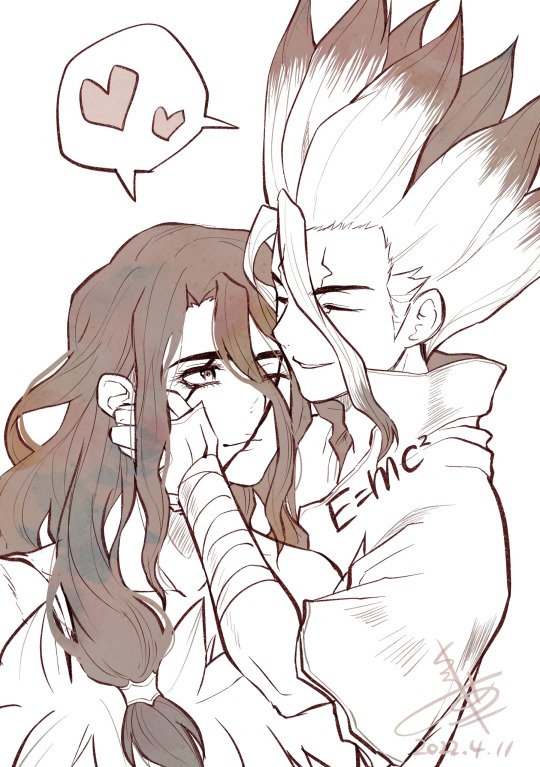Note
i would love to hear about “i breath in the atmosphere” pls 👀👀👀👀
It's a JayTim Wingfic AU campfire, in which both Timmy and Jason start out struggling with the social ramifications of having the wings they do 😔Certain events follow canon as well (like the Brucequest), although I diverge from canon eventually. And of course, they get their happy ending by finding acceptance and love with each other 🥰
1 note
·
View note
Text
A Jianghu Mystery of the Middle Xi: The Tomb of Li Xiangyi
By Qiling, University of □□ (2024)

Left: A photograph of the inscribed text at Li Xiangyi's tomb, reading, "The grave of the Sigu Sect's departed Sect Leader, Li Xiangyi". Right: Artist's sketch renditions from eye-level frontal and aerial side views, recreating how the tomb may have appeared during the Xi dynasty.
Among the numerous important archaeological finds from the Xi Dynasty, the tomb of Li Xiangyi is not the most well-known, nor has it yielded any artifacts of particular intrigue, yet it has raised questions about certain points in history since its discovery. The tomb constitutes a small site, near a mountainous overlook which should have received little common traffic at the time of construction. Its structure is in line with some other aristocratic burials of the Middle Xi period: aboveground, with a chamber at the center of a raised rectangular dais several meters wide, large enough to bear only a single individual. A stone marker, which has survived in legible condition until today, declares it the tomb of Li Xiangyi, leader of the Sigu jianghu sect.
Records about Li Xiangyi are found at other archaeological sites contemporary with this tomb, and so his name is not an obscure one. The Sigu Sect complex has already undergone excavation for nearly two decades, with evidence that Li Xiangyi spent several years there as its first sect leader and founder. His tomb is within two hours' walking distance of the Sigu site, though isolated in its location, compared to the Sigu Sect's grand mountain entrance. (The complex itself was inhabited well after his death; bamboo slips cite Qiao Wanmian as the Sigu Sect's next major leader some years after, who oversaw it for several more decades into the later Xi). In addition, the Baichuan-Pudu site, closer to the eastern coast and historically the headquarters for the Baichuan Court, is affiliated with Li Xiangyi. Its origins apparently lay in an offshoot of the Sigu Sect, which grew into its own independent legal organization after his death.
Legends surrounding Li Xiangyi's life have been well-documented, both at Sigu and Baichuan-Pudu, but also in books and transcriptions of oral stories at sites around the country. These are dated to both the Middle and Late Xi periods, as well as a few scattered mentions in writings from the following dynasty. As a jianghu sect leader and swordsman, Li Xiangyi's reputation truly preceded him. Some tales speak of his early accomplishments, ridding towns of villainous tyrants and defeating criminals. Others talk about the founding of the Sigu Sect when Li Xiangyi was seventeen, and his subsequent missions leading his fellow swordsmen to protect the borders of the country. Not all of these narratives can be verified with surviving historical proof, and given Li Xiangyi's status in the shifting canon of folklore, the percentage that are hyperbole or fiction is likely significant. However, one that should be true, and is the most frequently told story throughout these sources, is that of Li Xiangyi's death.
All texts place Li Xiangyi as having died relatively young, with some providing a specified age, generally around twenty. He perished in a duel with Di Feisheng, leader of the Jinyuan Alliance, a rival jianghu organization and presumed threat to the Sigu Sect. As the sources say, the Jinyuan Alliance killed Li Xiangyi's sect brother, Shan Gudao, and in retaliation he used the Sigu Sect to launch a war against the Jinyuan Alliance. His final battle was the last in this war, dying in the East Sea on Di Feisheng's ship. The Jinyuan Alliance in return was badly defeated by the Sigu Sect; excavations at its first compound in the last five years have shown evidence of siege, with fire having destroyed large parts of the buildings. Afterward, the Sigu Sect disbanded without Li Xiangyi, with only the Baichuan Court continuing to function, before being resurrected one decade later.
Given this knowledge we have about Li Xiangyi, the matter of his burial should be straightforward. He had a tremendous impact on the jianghu in the few short years that he stood at its peak. He died heroically, if tragically, to obtain justice for a brother. He was honoured with a tomb, standing guard over the sect he dedicated his youth to. Why, then, is said tomb regarded as somewhat of a mystery?
This tomb was first stumbled upon during extended surveys of the Sigu site territory, with excavation taking place within the last two years. Parts of the stone chamber and foundation of the dais have withstood time, as have most things left inside. The tomb bears no signs of looting. However, there are some details which, alongside discoveries from other archaeological sites, contribute to a shadow of uncertainty on the existing narrative of Li Xiangyi's life.
Firstly, is that the austerity of the tomb does not line up with what we know of Li Xiangyi. Although overall sufficient enough for someone of his great reputation, the tomb is rather plainly embellished. There are an unexpectedly small number of burial objects inside, with those present being neither rare nor expensive. For all his contributions to the jianghu, less money and resources were poured into remembrance of Li Xiangyi than seems proper for his time.
Secondly, and far more significantly, is that the tomb holds no human remains. Whether the fact of Li Xiangyi having no recovered body to bury was made public is unknown; if it was, we do not have record of it. Certainly those who arranged for the tomb to be built and sealed would have carried this with them the rest of their lives, but no one else may be accounted for. Granted, it is not impossible for a disappeared body to have been common knowledge or presumption, as Li Xiangyi was killed at sea with no guarantee of being found. Yet this, combined with the ordinary appearance of the tomb, causes the entire site to appear... a nominal thing. Constructed to maintain acknowledgement of Li Xiangyi's absence, though his death was only marked by words, rather than a physical state.
He was given a tomb, but was Li Xiangyi truly dead before it was built?
In terms of the aforementioned other archaeological site findings, there is one that potentially implicates Li Xiangyi's death at an interesting political junction, within the context of the dynasty. The Xi Dynasty was unstable and relatively short-lived, established after taking back the Central Plains and adjacent territories from the southern conquering state of Nanyin. It endured for just under two centuries, the first of which was fraught with pockets of conflict, with many jianghu skirmishes such as that between the Sigu Sect and the Jinyuan Alliance. The greatest threat to the Xi Dynasty (until its fall) came one hundred years after its founding. Recovered archival records from the Xi capital excavation report that remaining Nanyin loyalists attempted a coup, supported by jianghu organizations, including a restored Jinyuan Alliance (although whether Di Feisheng was still its leader at this time is unclear). This attack was ultimately unsuccessful, but important to note is that the leader of this renewed Nanyin force is described as being Shan Gudao, Li Xiangyi's former sect brother.
Although Li Xiangyi brought the Sigu Sect into a war upon news of Shan Gudao's death, that demise seems to have been faked, with Shan Gudao disappearing underground only to reappear as part of a later rebellion. Could Li Xiangyi have been aware of this? Was his reaction to Shan Gudao's apparent death genuine? Or part of a coordinated plan, using him as a reason to destroy the Jinyuan Alliance, to eradicate any future resistance? Did Li Xiangyi, too, fake his death alongside Shan Gudao, in service of a shared cause? Were remnants of the Sigu Sect instructed to build an empty tomb, cementing Li Xiangyi as a dead hero so he could work in the shadows of the jianghu instead?
This is merely speculation, contradicted by the fact that if Li Xiangyi had indeed done as such, unlike Shan Gudao, after his duel with Di Feisheng he has no reappearance in any surviving records or at any archaeological site. As well, Li Xiangyi should have had no motivation for committing to such a scheme, with even loyalty to Shan Gudao a stretch for putting all the lives of the Sigu Sect on the line. That being said, history has a way of surprising the present, and this theory may not be entirely ruled out. At any rate, Shan Gudao's survival is a baffling accompaniment to Li Xiangyi's (lack of a) burial, one which will hopefully receive clarifying answers in future archaeological developments.
Perhaps the strangest piece of the puzzle concerning the end of Li Xiangyi's life, however, is Di Feisheng. After the Jinyuan Alliance was scattered by the Sigu Sect, stories regarding Li Xiangyi declared him dead and disappeared. Yet not unlike Shan Gudao, he became known in the jianghu once more about ten years later, witnessing the Nanyin's attempted coup and living long after. His tomb remained untouched, and was excavated eight years ago as part of the greater Tianji Mountain site project. The location of Di Feisheng's tomb is surprising, not only because it directly links him to the powerful and wealthy He clan of Tianji Manor, but also because he was buried next to their sole young master during the Xi Dynasty, Fang Duobing.
The son of financial minister Fang Zeshi and engineering master He Xiaohui, Fang Duobing became a notable youxia travelling the jianghu in the emperor's name, assigned in the wake of the attempted Nanyin coup. According to palace records, he was also betrothed to Princess Zhaoling, although the marriage agreement was eventually formally dissolved. What is otherwise known of Fang Duobing was his admiration of Li Xiangyi, having styled himself as a follower and disciple of him during his youth. As well, one eye-catching artifact among Fang Duobing's burial goods was a preserved wooden replica of a blade, with Li Xiangyi's name carved near the hilt. Likely a children's toy, prized and kept safe throughout Fang Duobing's life.
The exact nature of the relationship between Di Feisheng and Fang Duobing is not entirely certain, but it must have been a very close one, for Di Feisheng to have the privilege of burial on the Tianji estate. This topic justifies future study for our understanding of the Tianji He clan, already known in prior generations for its socially subversive relationships, but pertinent to Li Xiangyi is that the man whose most infamous act was to kill him, was laid to rest beside one who revered him. Why was there such a bond between these two figures, if the stories of Li Xiangyi's death have any truth to them? Did Li Xiangyi really die by Di Feisheng's blade? Did Li Xiangyi's empty tomb, plausibly signifying Di Feisheng's innocence, alter his relationship with Fang Duobing? Or indeed, did Li Xiangyi, the man himself, have a part to play in this?
No traces of him from this time remain in the archaeological record, true. But this should not be taken to mean without doubt that he was not alive then at all.
The discovery of Li Xiangyi's tomb has been an exciting development for studying this era of the Xi Dynasty, but it has also outlined doubt in areas of one man's life that were previously taken as likely facts. Li Xiangyi's tomb is scarcely fitting for his name as a founding sect leader, built more for the sake of its existence than anything else, and there was no body sealed inside to begin with. In addition, Shan Gudao— someone dear to Li Xiangyi— established a precedent of faking his death. Di Feisheng, known across the jianghu for killing the man, held a close bond with someone later in life who had personally looked up to Li Xiangyi, and so he may not have been fully responsible for Li Xiangyi's death to begin with.
What truly happened to Li Xiangyi, resulting in a tomb such as this? The past holds the answer, knowing things that we do not. Hopefully the future of archaeology will continue leading to new discoveries, and allow us to more completely understand the legend that was Li Xiangyi.
99 notes
·
View notes
Text
(yet another...) WIP Title Tag Game!
Tagged by @krizariel, thanks for tagging me!
Rules: Reveal the titles of the documents in your wip folder and tag as many people as there are documents. Let others ask questions about the ones that interest them and post snippets or explain the contents as you see fit!
I... have so many, many WIPs, both titled and untitled, art and fic, that I'm fucking scared of looking at them ala ticking-heart-underneath-the-floorboards-style (*orz) So let's just look at the ones I still have a hope of finishing sometime, alright? They are:
Fanfic WIPs
A Soldier Boy (Can Never Go Home) [Tokyo Revengers]
I Rise, A New Life in the Heart of Death [RasTim]
I Breath In The Atmosphere (Let It Wash Over My Fear) [JayTim]
A Bloody Love Story [TsukaSen]
Fanart WIPs
以后,我(前)死对头的徒弟得叫我夫君 (From Now On, My (Former) Nemesis's Disciple Must Call Me Husband) [DiFang]
先生们,在大厅观众下也太耀眼了吧 (Get a room, you two) [DiFang]
Untitled TsukaSen art
Untitled Sefikura art
Untitled JayTim vacation art
Assorted Commissions and Gift Arts 😬😬😬
Tagging: @godotismissingx @szfiction @difeisheng @meggie-jolly @ladytauria; I am going to cheat by saying it's ok to tag just 5 people instead of goddamn 10 😂(Not tagging Raven so you can do it, Meggie-Jolly.)
13 notes
·
View notes
Text
My face is having uncontrollable spasms. Great. It hurts really, really, really bad.
I think part of why I have trouble explaining pain to the doctor is when they ask about the pain scale I always think “Well, if someone threw me down a flight of stairs right now or punched me a few times, it would definitely hurt a lot more” so I end up saying a low number. I was reading an article that said that “10” is the most commonly reported number and that is baffling to me. When I woke up from surgery with an 8" incision in my body and I could hardly even speak, I was in the most horrific pain of my life but I said “6” because I thought “Well, if you hit me in the stomach, it would be worse.”
338K notes
·
View notes
Text
A surprisingly helpful bit of social maneuvering I've figured out from trial and error:
Throughout your life, you are going to need things from people. Often, it's going to be on a deadline. And when that deadline passes, you generally want to know what's going on. So, you need to ask them.
There are two kinds of people, broadly, in this situation. The Shameless will tell you what the holdup is, with absolutely no regard for if the reason is "good enough". This is actually very helpful, because you get the real reason immediately, and can start working on a solution.
The Ashamed is trickier. People who are Ashamed are people who were often told they were giving excuses when they were trying to explain, and they'll often avoid you until they solve the problem on their own. This causes them and you a lot of stress, and often takes a lot longer to solve.
Long term, the strategy for dealing with people who are Ashamed is to provide a supportive environment where they're comfortable sharing any problems they're having with getting things done. But, there's a way to at least partially short-circuit that:
Provide an explanation for them.
One example might be "Hey Susan, I noticed that I don't have your report yet. Are you busy with other projects?" The readymade explanation signals that you're willing to accept an explanation, which is the big anxiety point.
Sometimes, you still won't get an honest answer- especially if the honest answer isn't "good enough" by the standards of the person who traumatized them. But, I've found that it often at least gets you a lie that lets you give them some slack or work around the problem.
Let's say that Susan has actually completely forgotten that she needed to do the report. She's horrified at herself, and completely unwilling to admit the real problem. But, she can now safely reply with "Sorry Jennifer, I've been swamped, and it got lost in the mix. I can have it to you in two days. Does that work?"
From there, so long as Susan gave an estimate for when she can actually do it, she and Jennifer can hash out a solution.
It's not a perfect solution, but it works astonishingly well for how small of a change it is.
3K notes
·
View notes
Text
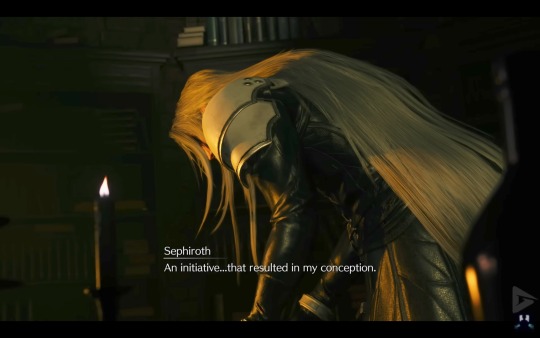
FFVII Rebirth introduces something never extensively explored in the original game or in the compilation of Final Fantasy VII: Sephiroth's anger towards Professor Gast’s experiment and the contempt he came to harbor towards ShinRA as an organization.
(Herein lurk spoilers.)
While the latter is something the fans have glimpsed on and off throughout previous installments, the second part of the Remake amplifies it ever so more. What began as admitting that the company had fabricated his legend and expressing a desire to live a normal life in Ever Crisis gradually transforms into a lack of clarity regarding his reasons for fighting in Before Crisis (as prompted by Elfe), followed by an open disgust towards Hojo's and Hollander's experiments when confronted with Mako pod entities during the hunt for Genesis. Sephiroth and Zack's ordeal during Crisis Core events appears to undercut his willingness to stay, as he famously considers leaving the corporation right before embarking on the ill-fated Nibelheim expedition.
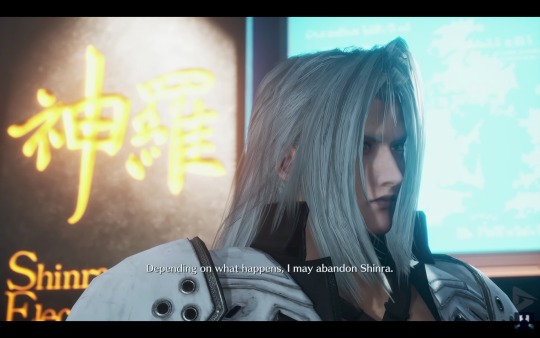
FFVIIRb picks off where we left off, painting a more complete picture of Sephiroth's dissatisfaction with ShinRA overall. Interestingly, one of the discarded sequences from the original game featured Sephiroth hinting at his lack of affection for his employer as early as the truck ride.
Narratively, the sequence spans the gap between OG and Crisis Core's departure cutscene, implying that Sephiroth used the time on the road to reflect on his current and future connection with ShinRA. His companion, however, does not appear to understand why he is bringing the topic up. What distinguishes Rebirth is the suggestion that Sephiroth came to view the entire ShinRA system as a problem, rather than just a few rotten apples. He no longer singles out Hojo, but rather the entire ShinRA branch, indicating that something's wrong with the system. When "Cloud" casually inquires about the problem with the Nibelheim reactor, Sephiroth responds that it is "people who run it," adding that this particular site is controlled by the Research and Development department. In addition, in response to "Cloud's" fair comment regrading the lack of transparency in company's operation, he rather sarcastically suggests to bring the issue with the President, thus implicitly conveying the futility of the endeavor.
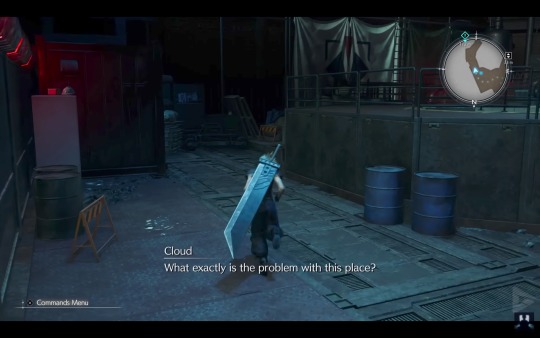
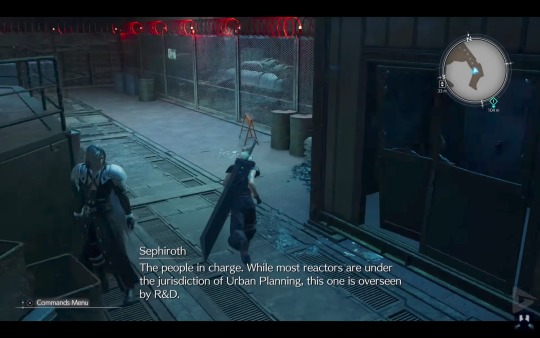
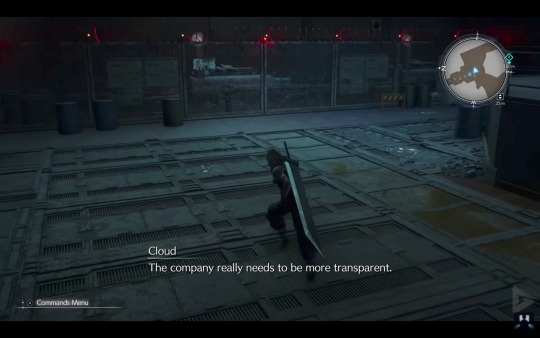
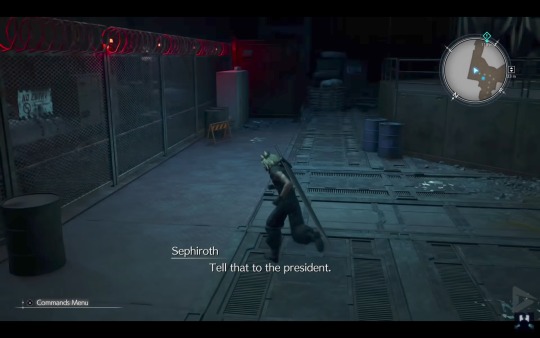
When the party encounters Mako pod residents, one can detect genuine rage in his voice. While Sephiroth had previously shown bitterness for the test subjects during CC, it was tinged with disgust/pity rather than wrath. And once again, I’m grateful to Tyler Hoechlin for broadening his range in this particular segment.
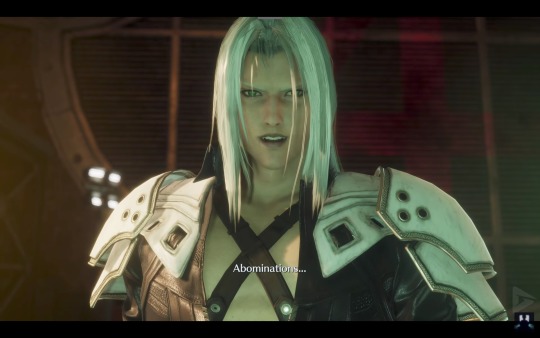
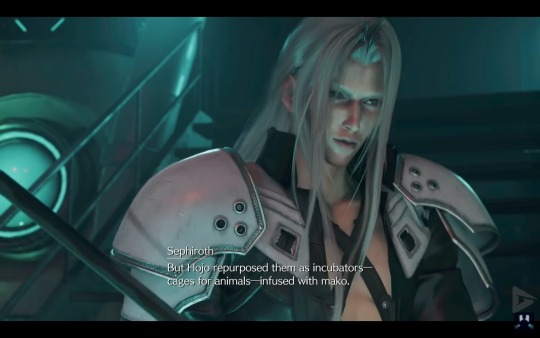
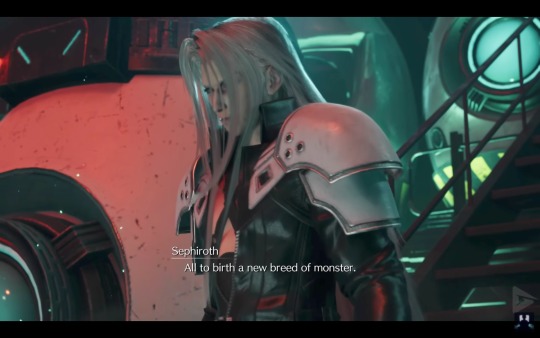
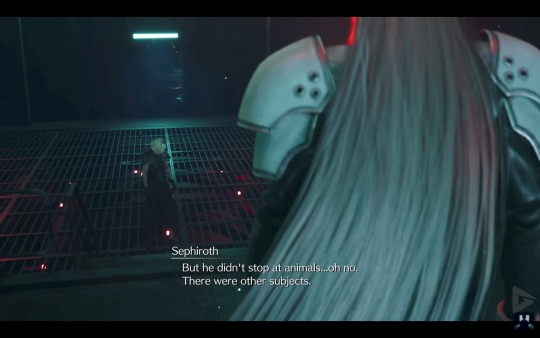
"Cloud's" reaction to the contents of the pods, however, came off a little weird. The confusion appears out of place, because Zack had seen it all before — he had been there to watch the aftermath of Hollander's work; is it really odd that ShinRA's chief R&D scientist spearheaded the entire thing? Perhaps, unlike Sephiroth, Zack treated it as a rotten-apple issue, rather than a systemic issue. Or maybe this is an example of Cloud being an unreliable narrator, having conflated his own experience with that of Zack, which also explains Zack being sort of too green for the First Class throughout the Nibelheim portion of the game.
The shift in Sephiroth's perspective, from singling out Hojo's misdeeds to viewing ShinRA's itself as a systemic problem, is further highlighted during the mansion segment. This is no longer a strictly Hollander or Hojo issue. Human experimentation formed the fundamental core of what ShinRA is now, and those were approved from the very top. As Sephiroth puts it with barely concealed disgust, as soon as the company realized what had fallen into their hands, they became ambitious.
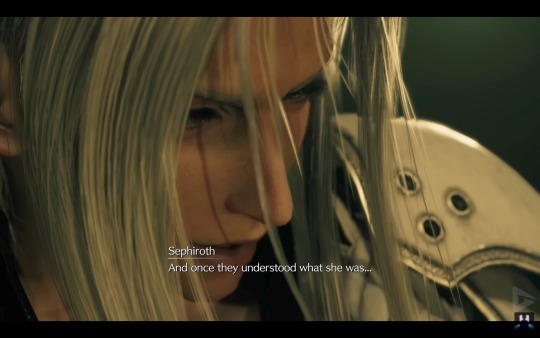
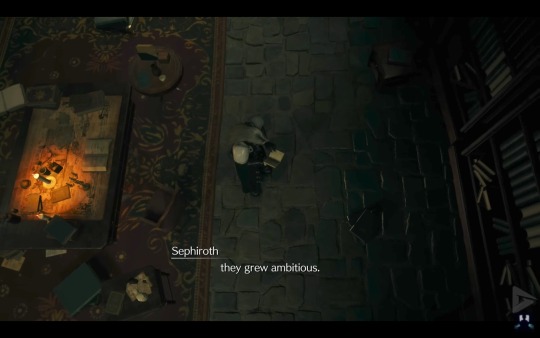
The wording also strikes a contrast to how he used to refer to the company in the past; as such, when Angeal deserts, Sephiroth states that Angeal has betrayed “US”, which points at both his personal connection to the person and the fact that Sephiroth likely saw himself as part of ShinRA circle. In the library, however, he distances himself by referring to the company as THEM, thus no longer perceiving himself as a part of it.
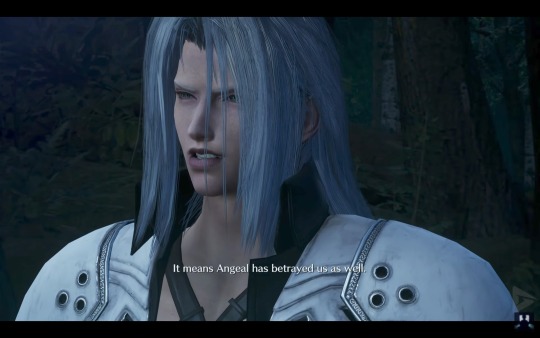
More important still is the rage he expresses when quoting excerpts from Gast's notes. The anger is new, never before seen touch. Sephiroth has been portrayed in the moment differently throughout earlier installments — dejected, perhaps overwhelmed, but never angry enough to snarl and nearly flip the table.
And it's wonderful. It's authentic, and it makes sense. It makes you question how much of that rage has been bottled up, compartmentalized, and never fully processed throughout the years. That rage should have existed, but was suppressed by ShinRA, before becoming internalized and sealed.
The scene is extremely on point on another level as well. As the flash of rage passes, and Sephiroth looks away, hiding eyes behind bangs — a gesture previously briefly appearing in Crisis Core.
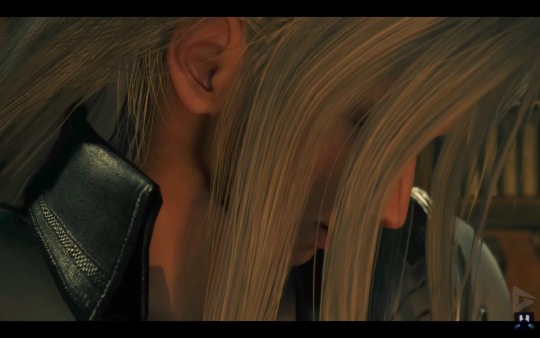
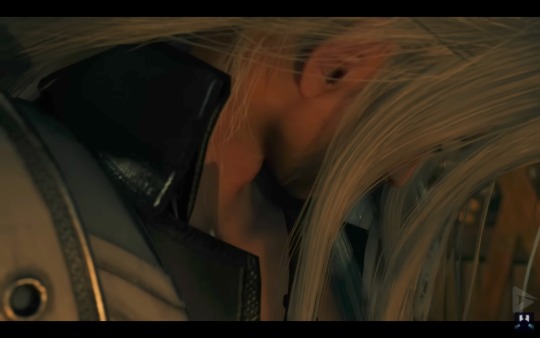
One could interpret the body language as being ashamed and unwilling to show his composure cracking. Even in this state he KNOWS he wasn't supposed to let anyone see hurt or anger, wasn't supposed to lose cool. The "wonder child" and the "poster boy" is not to be seen as something other than “efficacious” and “collected”. The habit of suppressing displays of emotion or physical/psychological ailment had apparently become a part of himself. It doesn't take a lot of imagination to deduce why the habit persists. The internalized compulsion to live up to the expectations placed on him by ShinRA and the myth it imposed on his character, as well as the internalized imperative not to reveal to someone like Hojo — anyone— the extent to which their acts or words affect him. There's also another layer to this shame — one of being an artificial creation, but that's for another write up.
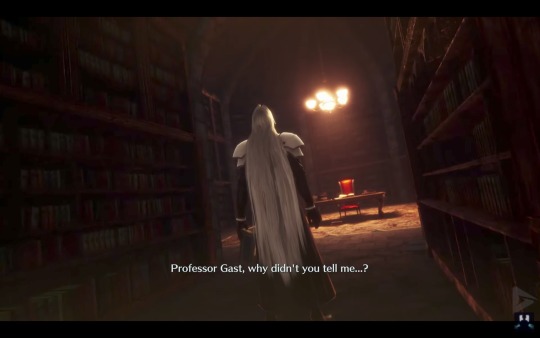
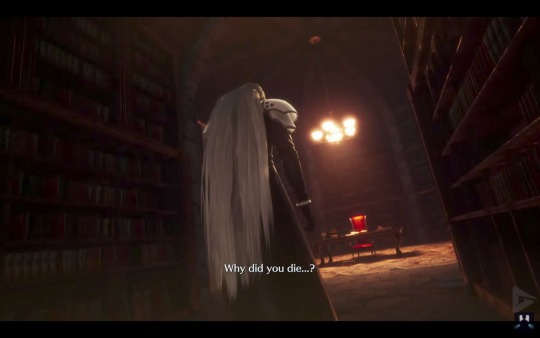
The anger towards Gast differs greatly from the way Sephiroth went “Why didn't you tell me?” in previous iterations of the Nibelheim incident. In retrospect, Gast's supervision of the project, involvement in Sephiroth's life, and unexpected departure seem like a betrayal. Gast had not only abandoned Sephiroth, who had likely come to see him as a salient figure in his youth, but had also been lying to him all along, until finally discarding him, as Sephiroth might believe. Gast therefore falls from grace, becoming yet another person who misled, attempted to exploit, and eventually abandoned him to deal with the consequences on his own.
309 notes
·
View notes
Text
WIP TAG GAME
Tagged by @meggie-jolly
RULES: In a new post, show the last line of something you wrote or drew and tag however many people you like.
Not the last thing I drew, because I can't show NSFW stuff on tumblr, but here, have a present I was working on for a friend:

Tagging @difeisheng @szfiction @godotismissingx @ladytauria @krizariel @chibinightowl @momosandlemonsoda 'cos I'm curious about what you guys are working on, but no pressure if you don't want to or can't answer this.
7 notes
·
View notes
Text
15 questions, 15 people
Tagged by @godotismissingx
1. Are you named after anyone?
Not to my knowledge, no.
2. When was the last time you cried?
Maybe 4 months back? I'm the kind of sucker who cries at sad things in media and fiction lol.
3. Do you have kids?
Most definitely not, and don't plan to have them either.
4. Do you use sarcasm a lot?
Not a lot; it's not my default humour mode.
5. What's the first thing you notice about people?
The emotion they project, I think. Whether they're relaxed, comfortable, bored etc.
6. What's your eye colour?
Blackish brown.
7. Scary movie or happy ending?
Happy ending always wins for me, hands down.
8. Any special talents?
...I can stick unreasonably/piping hot food in my mouth and eat it comfortably?
9. Where were you born?
In Southeast Asia.
10. What are your hobbies?
Singing, drawing, writing, gaming, watching anime, reading.
11. Do you have pets?
Yes, two cats. Their names translate to Cowhide Candy (for her clinginess) and Demon King (for the very typical tortoiseshell attitude).
12. What sports do you/have you played?
I hate most sports. I usually just walk for exercise, and sometimes I do yoga.
13. How tall are you?
4'11. I'm a complete midget. (*is sad)
14. Favourite subject in high school?
English and Math (I know, very stereotypical of me)
15. Dream job?
Freelance artist or librarian, but can't make a living off of it rip.
Not tagging anyone, but feel free to @ me if you see this and decide to play too.
0 notes
Text
If people were too mean to you when you were growing up, a newborn animal will materialize inside your brain and it’s so so scared and shivering and it will stay there for years. Decades, even. And whenever you say something kind of weird but true to your heart the animal will tell you “Noo! You can’t say that! If you say that, everyone will hate you!”. The animal means well. It’s so so small and everything is so scary for them and it’s just trying to protect you. But listen to me. Listen to me. Whenever this happens, you can’t do what the animal says. You can’t. If you do, you’ll become as scared as the animal. You have to keep saying weird shit. You have to keep doing things the animal wouldn’t approve of. If you do enough things that scare the animal, maybe one day it’ll go to sleep.
32K notes
·
View notes
Text
At some point in your life, you were taught that being slightly annoying is an unforgivable sin. Maybe it was by your parents or a teacher or a friend or a bully or an older sibling. But someone taught you that being slightly annoying is a crime punishable by death.
You must unlearn this.
You must accept that all people will be annoying at some point or another in their lives, maybe all of their lives, and that this is okay. It is okay for strangers on the bus, it is okay for children in the grocery store, it is okay for people on social media, and it is okay for you.
If you ever want to truly love your fellow humans, if you ever want to truly love yourself, you must have forgiveness for being annoying.
32K notes
·
View notes
Text
unavoidable that you will be the villain in someone else's story. You will be painted in an unfavorable light. You will be the irredeemable one. and all of this will happen despite how nice you might usually be or how kind or how respectful or how warm. and you will just have to move on.
31K notes
·
View notes
Text
Watching Mysterious Lotus Casebook common thoughts:
“Gay!”
“Ugh another mystery? Should I fast forward?”
“Omg that mystery was awesome I’m glad I didn’t fast forward!”
“Someone on tumblr… please gif every facial expression Cheng Yi is rolling out for this show…”
“Someone on tumblr made a gif set of my scene!”
“Gay!”
“Where is the dog?”
“I want a dumbass best friend to travel the world with who I can tease and play with…”
“Dude stop giving your qi or chi or whatever away! You’re gonna die!”
“Omg his eyelashes! Hmmm villain hottie.”
“This crazy bitch rules. Her agenda is dick and mayhem. She’s getting one at least.”
“Everyone has big houses in this show. And lotus ponds. And teenie tiny tea cups.”
“Poly gay!”
“Dude stop using your martial arts you’re gonna die!”
“The women in this show are great. But my Cheng Yi is my prettiest princess…”
“Villain guy (I mean is he even?) is soooooo… I mean… his hair! His grumpy face. Look at how he just stands there all menacing and hot…”
“The dog!”
“How does he keep his white robes clean? What was the laundry process back then anyway?”
“Gay!!!!”
“This show is made for tumblr peeps. Like… how can there be so much? Soooo much?!”
“Cheng Yi! Don’t cry… nooooo (let me drink your tears you beautiful creature it’s preposterous how pretty you are when you cry)”
“I think we are nearing the point where not telling your adorable dumbass your identity is borderline cruel… come on…”
“GAY.”
57 notes
·
View notes
Text
qiao wanmian and di feisheng's first appearances in the present-day narrative are mirrors of each other, orbiting the presence of li xiangyi and li lianhua. episode 5 introduces them both in the same way, stepping back into li lianhua's life while he watches from out of sight. di feisheng emerges from seclusion, qiao wanmian meets xiao zijin in yucheng. and what other information this episode gives us about these characters is the inverse of what we would've expected. where we assumed qiao wanmian might be the ex-lover, still mourning after ten years of missing li xiangyi, the first thing we (and li lianhua) see is that she's happy with someone else. it comes to be more nuanced than that, but the first impression we get is that qiao wanmian has moved on. di feisheng's first moment he gets by himself, meanwhile, is him drinking his grief over li xiangyi's absence away. he has jinyuanmeng bowing to his feet and and a tremendous amount of power in the jianghu he could use against anyone, yet here is, seemingly, above many other things, lonely.
the next arc serves to reinforce this idea, that where qiao wanmian by normal genre conventions should be the one who couldn't get over li xiangyi, it's di feisheng who continues to cling onto his history with him instead. during the liansanjiao's trip to baichuanyuan and pudu temple, we see qiao wanmian trying to work through her lingering emotions about li xiangyi over and over, and eventually (thanks to li lianhua's intervention) achieves some kind of tenuous closure on that part of her past. all of we see of di feisheng, on the other hand, is him becoming increasingly obsessed with what he views as unresolved events, until he finally chokes li lianhua against a wall to interrogate him about it. mysterious lotus casebook swapped what might be more typical framing of these characters. qiao wanmian is not a sad figure waiting for her sweetheart to return, but someone who realizes she was more attached to what he represents than to him, and in finding him as a person manages to become friends in this new life of the present. di feisheng isn't someone who moves on from an existence measured against li xiangyi and finds a new way to define himself, but rather a person who wound up isolated and frozen in time for ten years after losing him, and still struggles to leave their relationship behind or allow it to evolve.
tl;dr the real jilted lover of li xiangyi by the choices of the story is di feisheng, not qiao wanmian
101 notes
·
View notes
Text
here's the thing about li xiangyi: the one person who broke him was shan gudao. that man died and his whole sense of self, his worldview, his will to live, all vanished with him. he threw away his beliefs, his leadership, his peace treaty, his comrades, his friendship, his health, his life, he burned his whole life down for revenge. he woke up as a ghost and walked the next ten years as a person without heart or soul. he only briefly regained the will to live when he understood shan gudao left behind a son. li xiangyi broke so many heart, li lianhua was sincerely and deeply loved, and it still didn't matter compared to the loss of shan gudao. a ratty disgusting man. a man who wanted him dead. a man who didn't deserve one second of li xiangyi's time. a man who tried to ruin his life. so what i am really saying is that "The Tortured Poets Department" is about li lianhua's one-sided ten year obsession with shan gudao
36 notes
·
View notes
Text
li xiangyi/li lianhua and jiao liqiao both spent ten years obsessively doing everything for the sake of someone they loved. someone they missed, someone who saved their life a long time ago and they never forgot it. but that all turned to dust when they learned that whatever they'd thought the other person had felt for them was actually a lie, and they had no route left but to face that reality in whatever way they could grasp
53 notes
·
View notes
